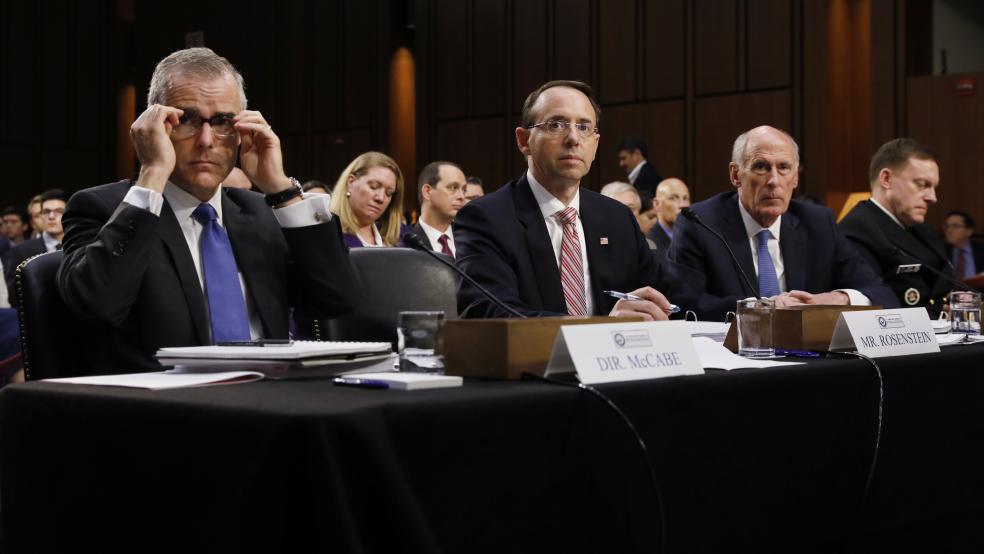A contentious Senate Intelligence Committee hearing on Wednesday morning raised the stakes for already highly anticipated testimony on Thursday from former Federal Bureau of Investigation director James Comey.
Appearing before the committee, four senior members of the U.S. Intelligence Community -- Director of National Intelligence Dan Coats, National Security Agency Director Admiral Mike Rogers, Deputy Attorney General Rod Rosenstein and acting FBI Director Andrew McCabe -- all repeatedly refused to confirm or deny reports that President Trump has asked senior officials to intervene on his behalf in an investigation into his campaign’s potential collusion with Russia during the 2016 elections.
Related: Here’s What to Expect When Comey Testifies About Trump
Shortly after the hearing ended, the committee released a copy of Comey’s prepared opening statement, which he is expected to deliver when Thursday’s hearing begins at 10 a.m.
Much of what has previously been leaked to the press by Comey associates appears to be confirmed in the statement. Among other things, Comey says that Trump, in an early conversation between the two, told the sitting FBI director, “I need loyalty, I expect loyalty.”
The statement also confirms that Comey believes the Trump attempted to persuade him to close down the investigation into former National Security Adviser Michael Flynn, urging Comey to let it go. In a bit of clarification, though, Comey said that he did not understand Trump to be requesting that the entire investigation into Russian meddling in the election be shut down, but just the element related to Flynn.
In the statement, Comey describes several interactions with the president in which it was at least implied that Trump wanted to see the pressure of the Russia investigation, which he described a “cloud” over his administration, lessened.
Related: With Comey in the Spotlight, the Trump Agenda Is Fading Fast
Comey’s statement appears to confirm Trump’s claim that the FBI director told the president on three different occasions that he was not personally under investigation, something that many experts had said was unlikely. Prior to his first meeting with Trump, Comey says in his statement, the FBI leadership team came to the joint decision that the president should be given that information if it seemed necessary or appropriate.
The former FBI director also documents multiple attempts by the president to get Comey to publicly acknowledge that his agency was not conducting a personal investigation of Trump himself. He wrote that during one phone conversation the president noted, “I have been very loyal to you, very loyal; we had that thing you know.”
Comey wrote, “I did not reply or ask him what he meant by ‘that thing.’”
Related: The Comey Firing Proves We Need Two Special Counsels, Not One
Whatever else arises from tomorrow’s Comey hearing, it is unlikely to eliminate the growing pressure on senior intelligence officials.
Multiple reports have surfaced in recent months suggesting that Trump approached both Coats and Rogers about either intervening in the investigation or making public statements meant to suggest there was no evidence linking Trump to Russia’s campaign to disrupt the election. However, neither would discuss his conservations with the president in an open session, even though they admitted that there had been no invocation of executive privilege by the White House that would have prevented them from doing so.
McCabe even refused to discuss conversations he had with Comey prior to the former director being fired by the president. Multiple acquaintances of Comey have told reporters that the president approached him on several occasions about ending an investigation that began with Trump’s former National Security Adviser, Michael Flynn.
The intelligence chief’s reticence means that Comey is so far the only person with direct knowledge of such alleged presidential requests to confirm them.
Related: 4 Big Questions Raised By Trump’s Decision to Fire FBI Director James Comey
How much further than his statement Comey will be willing to go on Thursday is still an open question. With a special counsel investigation underway and headed by his fellow former FBI director Robert Mueller, Comey could conceivably claim that his testimony would interfere with an ongoing law enforcement inquiry and decline to offer details.
Even so, Congress will eventually get the information it is seeking.
For his part Coats, and to a lesser degree Rogers, practically begged to be allowed to answer questions in a closed session, insisting that the issues being raised were inappropriate for a public hearing. However, senators persisted in seeking clarification from them, largely because both of them had already made public statements characterizing the upshot of their conversations with the president.
In the meanwhile, though, both fell back on language that left much open to interpretation. Coats said he never felt “pressured” to intervene in an investigation. Rogers said that he was never “directed” to do anything that he felt compromised his position.
McCabe, similarly, had previously said that he was unaware of any effort to impede the investigation that the FBI conducted until a special counsel was named last month to take over the inquiry.
At one point, West Virginia Sen. Joe Manchin noted that a closed session hearing was scheduled for later in the day and asked the intelligence officials if they would make themselves available for it. But Chairman Richard Burr (R-NC) quickly shot down that idea.





